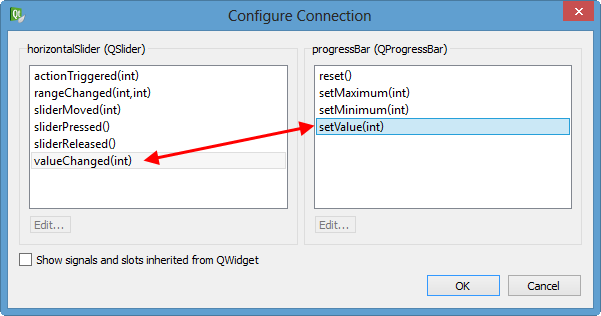Signal Slot Qt Connect
This is a powerful way to extend or modify the built-in signals provided by Qt. Intercepting the signal. Instead of connecting signal directly to the target function, you instead use an intermediate function to intercept the signal, modify the signal data and forward that on to your actual slot function. Uic (the User Interface Compiler of Qt) will automatically generate code in the dialog's setupUi function to connect button's signal with dialog's slot. So back to our example, the class implementing the slot must define it like this. Signals and slots are loosely coupled: A class which emits a signal neither knows nor cares which slots receive the signal. Qt's signals and slots mechanism ensures that if you connect a signal to a slot, the slot will be called with the signal's parameters at the right time. Signals and slots can take any number of arguments of any type.
Quite a frequent problem when working with signals with slots in Qt5, according to my observations on the forum, is the connection of slots in the syntax on the pointers to signals having an overload of the signature. The same applies to slots that have an overload.
Let's take a test class that has overloaded signals.
Here there is a signal, with an overload of the signature. Connect this signal will also be to the slots that are declared in the Widget class, and which also have an overload of the signature.
Signal Slot Qt Connection
How it was in Qt4
Within Qt4, everything was solved quite simply by specifying the signature of the signal and the slot in the SIGNAL and SLOT macros.
How it became in Qt5
But in Qt5, when writing in the new syntax of signals and slots, there are some problems. Because you need to make the static_cast of the method signature.

By the way, the new syntax also allows you to connect signals to slots with a smaller signature, as it was in Qt4.
Advantages of the new syntax
And now a stumbling block. Why use the new syntax of signals and slots? I still hear this question from time to time. Especially when people see such terrible castes of signatures.
- Therefore, I will list potential advantages:The ability to track errors in the connection of signals and slots at the compilation stage, rather than in the runtime
- Reducing compilation time by excluding macros from the code
- The ability to connect lambda functions, it's quite an important bun
- We protect ourselves from errors when we try to connect from the outside to a private slot. Yes!! Yes!! The SIGNAL and SLOT macros ignore the access levels of methods, violating OOP.
Signal Slot Qt Connect Slot
In general, for me this is enough, but for you?